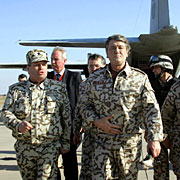Untitled Document
 |
|
Ukrainian President Viktor Yushchenko, right, visits a military base on Monday where Ukrainian troops are stationed.
Mykola Lazarenko, AP
|
The international military coalition in Iraq is shrinking, as two countries
finished pulling their troops out this month and three others announced plans
to remove hundreds more.
Coalition forces in Iraq now number fewer than 23,000 from 24 countries, down
from about 50,000 from 38 countries in 2003. The United States is reducing its
troop levels in Iraq, as well, with plans to have about 130,000 troops there by
spring 2006 instead of the 138,000 it had stationed there for much of 2005.
The troop reductions are signs that Iraq is stabilizing and Iraqi security
forces are increasingly able to keep the peace on their own, said Navy Lt. Cmdr.
Joe Carpenter, a Pentagon spokesman.
"Our allies' adjustments are very akin to our adjustments, and it's all
based on the conditions we're seeing in Iraq," Carpenter said. "It
would be wrong to interpret this negatively. This is an indication of progress
in Iraq."
White House spokesman Trent Duffy said each country has to decide on its own
whether to participate in the coalition, "and we respect those decisions."
The countries involved in pullouts or troop reductions include Ukraine and
Bulgaria, which both withdrew the last of their troops Tuesday. The Netherlands,
Poland, South Korea and Italy have reduced or plan to reduce their troop commitments.
The coalition pullouts won't have much effect on Iraqi security or U.S. plans
to further reduce its forces, said Anthony Cordesman, an Iraq expert at the
non-partisan Center for Strategic and International Studies in Washington.
"Many of these forces are more of political value than they are of military
value," Cordesman said, because they "defuse" the impression
that U.S. troops are occupiers.
The troop withdrawals show that international support for the war in Iraq is
eroding at the same time as public support in the USA, said military expert
Michael O'Hanlon of the Brookings Institution think tank. All of the countries
withdrawing troops have strong public opposition to the war.
"It reflects ongoing unpopularity of this war in those countries, but
it's not a precipitous pullout," said O'Hanlon, a frequent critic of Bush
administration Iraq policy. "The impact is negative, but only mildly so."
The coalition troops being reduced aren't heavily involved in combat against
insurgents. Instead, they mainly work on humanitarian projects, provide support
for other units or help train Iraqi forces.
The 8,000 British forces in southern Iraq are the largest non-U.S. foreign
force in the country and are actively fighting Shiite extremists and other anti-government
forces there. Prime Minister Tony Blair visited them this month and hinted that
he might begin bringing British troops home in 2006 but set no firm numbers
or timelines.
In announcing the Pentagon's plan to reduce U.S. troop levels last week, Defense
Secretary Donald Rumsfeld said the increasing numbers and capabilities of Iraqi
security forces are a key factor. The United States says there are about 216,000
Iraqi security forces trained and operating, with about 35,000 of them in units
able to take the lead in fighting the insurgency.
Rumsfeld has said that any further troop reductions would be based on progress
toward security and recommendations from commanders in Iraq. Much of that progress
depends on the success of the government chosen in Dec. 15 elections, Cordesman
said.
Contributing: David Jackson in Crawford, Texas

